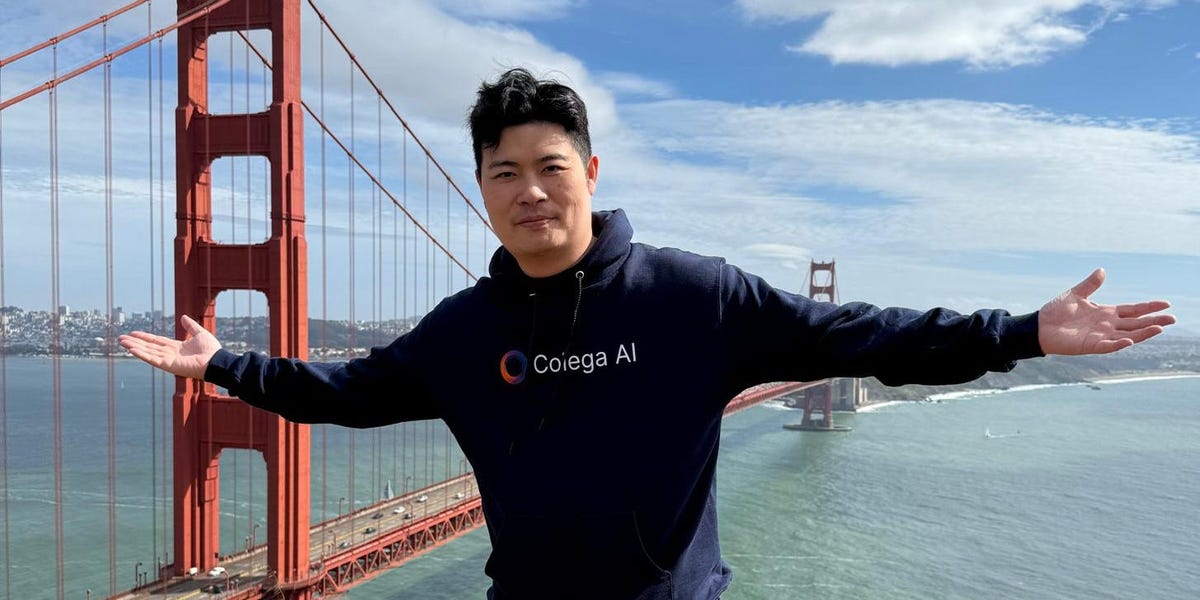This as-told-to essay is based on a conversation with Eric Fung, 37, the CEO of Colega AI in Tokyo. It’s been edited for length and clarity.
I was ready for a fresh start, so last year, I moved to Tokyo.
California wasn’t what it used to be: the cost of living was insane, and the Bay Area magic had dimmed. I wanted a reset. I had visited Tokyo as a tourist and loved its safety, cleanliness, and energy.
I also noticed something important. Japan is home to more than 3 million small businesses, including restaurants, bars, cafés, and retailers. Unlike the US, where big chains dominate, Japan still runs on a lot of mom-and-pop shops. That made it the perfect market to test my idea.
In 2024, I came for three months, the maximum my US passport allows. I don’t have roots in Japan — I’m not Japanese, I don’t speak the language, and my family is originally from Hong Kong. But I figured if I could make something work here, I could make it anywhere.
Realizing New York City wasn’t for me
I was born in Brooklyn, New York, and raised in a blue-collar household. My dad emigrated from Hong Kong and worked just about every job you can imagine — waiter, limo driver, FedEx worker. My parents even ran a restaurant for a while.
Entrepreneurship has always been in my DNA, though my parents hoped I’d take a more traditional “white-collar” path.
I studied advertising and public relations at Penn State. After graduating in 2010, I joined an advertising firm in New York. Within a year, I knew corporate life wasn’t for me. I jumped to a tiny startup, pitching products no one had heard of and leading a team older than me. I learned more in those three years than in classrooms, and it convinced me I wanted to build companies.
Related stories

Business Insider tells the innovative stories you want to know

Business Insider tells the innovative stories you want to know
New York didn’t seem like the right place to start, so at 24, I packed one suitcase and drove to San Francisco.
Fung moved to San Francisco because he wanted to build companies.
Provided by Eric Fung
Finding my edge in the Bay Area
My first ideas — from a job search site for visa sponsors to a travel camera app — didn’t take off, and stints in Big Tech only confirmed how slow and soul-crushing corporate life felt.
The Bay Area was brutally competitive, which I discovered firsthand at a fast-moving database startup. Working there sharpened my edge and taught me how to fight for market share.
In 2019, I co-founded my first company with two former colleagues. We built AI tools for engineers before “AI” was a buzzword. After early success, we exited, in part due to the pandemic. It taught me how unpredictable startup life could be.
After that, I went through my “restaurant phase” — opening a bubble tea shop, a pancake café, and a fusion spot in California. I set each up, ran it, then hired managers to take over. It was exhausting, but it gave me perspective.
Since then, I’ve sold one off and have managers running the other two. Now, I’m focused on my new startup, Colega AI, which builds AI marketing solutions for small businesses.
Our startup is US-registered, but the team’s based in Tokyo. There are seven of us — three in Tokyo, including me, and two of those are Japanese. The rest are spread across Asia since we’re remote-first, and no one’s in the US right now.
I moved here permanently in April.
Fung’s company is US-registered, but his team is based in Tokyo.
Provided by Eric Fung
Adapting to Japanese work culture
Moving to Tokyo has been both exciting and challenging.
To navigate the cultural and language barriers, I partnered with a local who helps bridge relationships on the ground. Early on, I worried that no one would take me seriously — a foreigner pitching products in a market known for tradition and formality.
The work culture in Tokyo is a world apart from San Francisco. I have Japanese friends who keep pillows under their desks because sleeping at the office isn’t unusual. Long hours and seniority hierarchies are baked into the system. As an American founder, I’ve had to balance respecting that culture with building a more flexible, startup-style environment.
My wife Shana, whom I met in San Francisco in 2018, runs her own jewelry and gemstone business and has adapted well — she loves how safe the city feels. But making close friends takes time, and the language barrier adds hurdles.
We’re renting a spacious studio near Shibuya that’s almost 50% cheaper than what we had in California. I pay about $1,350 for 500 square feet in a very convenient part of the city. A similar place in San Francisco would easily be $3,000.
While space is still tight by US standards, the trade-off is incredible access: late-night ramen, world-class dining, and trains to anywhere in minutes. Everyday costs are lower too — eating out and groceries are cheaper, though fruit can be shockingly expensive.
I’m not sure how long I’ll stay. If my business keeps me in Tokyo for five years, great. If it leads me elsewhere in Asia or back to the US, I’ll figure that out when the time comes.
Do you have a story about moving to Asia that you want to share? Get in touch with the editor: akarplus@businessinsider.com.

